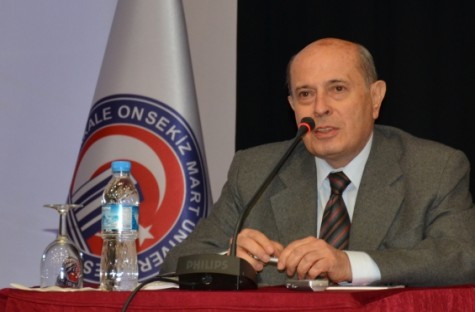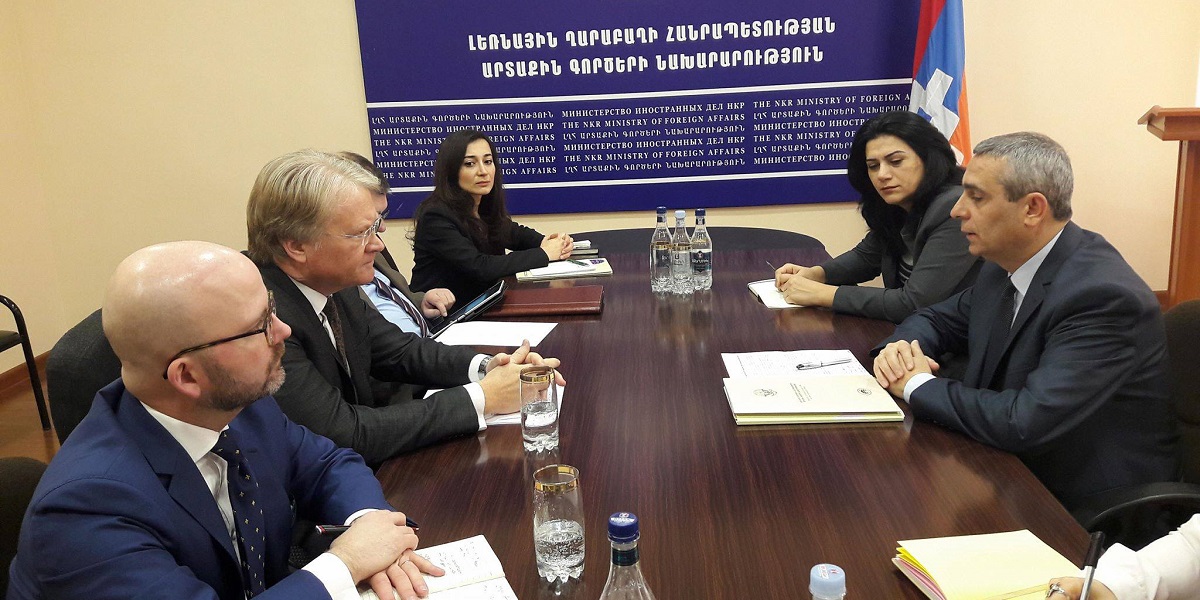
February 11, 2014
Ömer Engin LÜTEM
A couple of days ago Armenia’s Minister of Defense Seyran Ohanyan stated that Armenia hosts Russian troops on its territory because of a security threat emanating from Turkey, that Turkey would at least indirectly intervene in case of a renewed Armenian-Azerbaijani war for Karabagh, but that the Russian-Armenian military alliance would prevent such an intervention.
This statement is important because it was the first time in many years that an Armenian minister indicated that the Russian base in Gyumri is meant to prevent an intervention that may come from Turkey. In general, Russian and Armenian officials have chosen to remain silent as to purpose of the military base. During the extension of the military base’s presence up until 2044, Russian Minister of Foreign Affairs Sergey Lavrov had expressed during an interview in September 2010 that the base’s primary purpose was to protect the Russian Federation’s interests, that these interests entailed the protection of the stability of the South Caucasia and Caspian region. Also, during a visit to Azerbaijan that month, Prime Minister Medvedev had indicated that the time extension of the base did not constitute a threat to the security of Azerbaijan.
It is clear that the statements of the Russian statesmen and the Armenian Ministry of Defense are completely contradicting of each other. It could be presumed that Russia, which is in good relations with Turkey and which seeks to improve these relations even more, is not pleased with Ohanyan’s words and that it has possibly made its displeasure known to Ohanyan.
Why has the Armenian Minister of Defense felt the need to express such a statement?
In this regard, it has to be considered first of all that a small-scale of war is being carried out between Armenia and Azerbaijan by means of snipers. These border clashes, in which Armenia is unable gain dominance and which the Minsk Group is unable to stop, create a sense of uneasiness in Armenia. Furthermore, it brings to mind a possible intervention from Turkey due to the strategic partnership between Turkey and Armenia. There is a baseless notion in Armenia that Azerbaijan can be coped with on the military front. However, it is not possible to express the same thing for Turkey. Armenian Minister of Defense has sought to eliminate worries on this issue by expressing that the Russian base will prevent Turkey’s possible intervention.
It can be seen that besides what may be referred to as military reasons, there are also reasons which are political in their character.
There is a widespread notion in both Armenia’s and the Diaspora’s public that in 2015, Turkey - with the assistance of some countries - will recognize the Armenian genocide allegations and will subsequently pay compensation, and even that the process of giving land to Armenia will start. While it is obvious that the activities planned for 1915 and onward will create a discomfort in Turkey to some extent; it seems that it will not be possible for such activities to lead to the recognition of claims of genocide or result in further consequences. President Sarkisyan must be in the same view since he has stated about a year ago that it is not appropriate to compare 2015 to a tsunami; that, on the other hand, 2015 is a point that must definitely be reached, but it is not a watershed moment where a race ends and victory is gained; and emphasized that 2015 is not a target, but a process. However, as intense expectations persist in the Armenian public, it seems possible that a campaign of criticism towards the Armenian government will be launched in future in the case that the expectations are not met. For this reason, experiencing tensions with Turkey in addition to Azerbaijan in sensitive issues such as security may serve to block such criticisms.
On the other hand, the success of the initiatives and actions of Armenia regarding 2015 partly depend on the some other countries’ support. During Mr. Prime Minister’s last visit to Germany, it was revealed that some countries are preparing to make such a support: for instance Germany has allocated a budget for such an endeavor. There will be no need for other countries to help Armenia if positive developments are observed in Turkey-Armenia relations. Conversely, tensions between the two countries will be enough of a reason to support the “small and poor” Armenia. Hence, it can be seen that Armenia is following a policy of controlled tension with Turkey. It makes one think that this is the real reason why President Sarkisyan and other Armenian officials constantly make remarks against Turkey and reject Turkey’s constructive suggestions, since the establishment of normal relations between the two countries will contribute to the settlement of the Karabakh conflict.
© 2009-2025 Center for Eurasian Studies (AVİM) All Rights Reserved
No comments yet.
-
THE DECLARATION REGARDING ARMENIAN GENOCIDE ALLEGATIONS - Ömer Engin LÜTEM
Ömer Engin LÜTEM 02.04.2015 -
THE ARMENIAN QUESTION AFTER THE HOLIDAYS IV
Ömer Engin LÜTEM 07.09.2011 -
THE ARMENIAN LAW AND THE FRENCH CONSTITUTIONAL COURT
Ömer Engin LÜTEM 01.02.2012 -
EXPECTATION OF CONDOLONCE
Ömer Engin LÜTEM 01.05.2014 -
SARKOZY IS IN ARMENIA II
Ömer Engin LÜTEM 12.10.2011
-
 THE AMERICANA DEBACLE: THE ARCHITECTS OF DENIAL
THE AMERICANA DEBACLE: THE ARCHITECTS OF DENIAL
AVİM 22.08.2017 -
 VISIT OF SWEDISH MEMBER OF THE EUROPEAN PARLIAMENT TO KARABAKH: FORGOTTEN MISERY OF AZERBAIJANIS
VISIT OF SWEDISH MEMBER OF THE EUROPEAN PARLIAMENT TO KARABAKH: FORGOTTEN MISERY OF AZERBAIJANIS
Teoman Ertuğrul TULUN 15.02.2018 -
 EU TO START NEW NEGOTIATIONS WITH ARMENIA ON A NEW AGREEMENT
EU TO START NEW NEGOTIATIONS WITH ARMENIA ON A NEW AGREEMENT
Ali Murat TAŞKENT 18.10.2015 -
HOW IS THE ARMENIAN DIASPORA INFLUENCED
Alev KILIÇ 06.05.2013 -
 COP29 EVALUATION IN THE CONTEXT OF AZERBAIJAN - ARMENIA RELATIONS
COP29 EVALUATION IN THE CONTEXT OF AZERBAIJAN - ARMENIA RELATIONS
Bekir Caner ŞAFAK 14.04.2025
-
25.01.2016
THE ARMENIAN QUESTION - BASIC KNOWLEDGE AND DOCUMENTATION -
12.06.2024
THE TRUTH WILL OUT -
27.03.2023
RADİKAL ERMENİ UNSURLARCA GERÇEKLEŞTİRİLEN MEZALİMLER VE VANDALİZM -
17.03.2023
PATRIOTISM PERVERTED -
23.02.2023
MEN ARE LIKE THAT -
03.02.2023
BAKÜ-TİFLİS-CEYHAN BORU HATTININ YAŞANAN TARİHİ -
16.12.2022
INTERNATIONAL SCHOLARS ON THE EVENTS OF 1915 -
07.12.2022
FAKE PHOTOS AND THE ARMENIAN PROPAGANDA -
07.12.2022
ERMENİ PROPAGANDASI VE SAHTE RESİMLER -
01.01.2022
A Letter From Japan - Strategically Mum: The Silence of the Armenians -
01.01.2022
Japonya'dan Bir Mektup - Stratejik Suskunluk: Ermenilerin Sessizliği -
03.06.2020
Anastas Mikoyan: Confessions of an Armenian Bolshevik -
08.04.2020
Sovyet Sonrası Ukrayna’da Devlet, Toplum ve Siyaset - Değişen Dinamikler, Dönüşen Kimlikler -
12.06.2018
Ermeni Sorunuyla İlgili İngiliz Belgeleri (1912-1923) - British Documents on Armenian Question (1912-1923) -
02.12.2016
Turkish-Russian Academics: A Historical Study on the Caucasus -
01.07.2016
Gürcistan'daki Müslüman Topluluklar: Azınlık Hakları, Kimlik, Siyaset -
10.03.2016
Armenian Diaspora: Diaspora, State and the Imagination of the Republic of Armenia -
24.01.2016
ERMENİ SORUNU - TEMEL BİLGİ VE BELGELER (2. BASKI)
-
AVİM Conference Hall 24.01.2023
CONFERENCE TITLED “HUNGARY’S PERSPECTIVES ON THE TURKIC WORLD"









